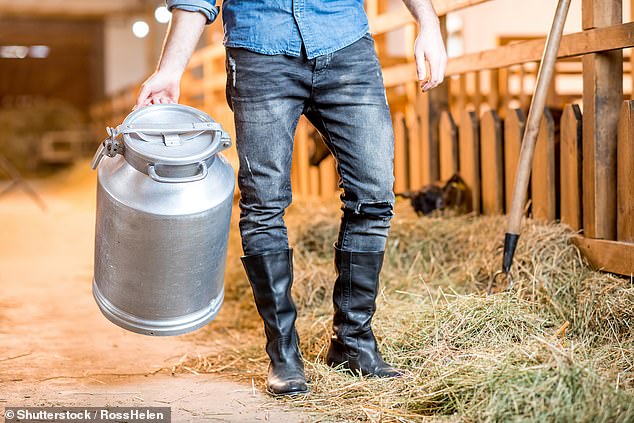As Avian influenza jumps to a human from a cow for the third time in the America, the latest in a string of such cases in recent weeks, public health experts have told MailOnline that Britain should be preparing for an outbreak.
Their warning comes as the Biden administration revealed it was brokering a deal that would allow doses of a bird flu vaccine to be prioritised for the US.
A panel of UK Government appointed experts said the situation in America, where the virus has made its way into cattle, was ‘unprecedented’ and had boosted the chances of human-to-human transmission to up to 35 per cent, compared to just five per cent previously.
They still assessed the current overall current risk as ‘very low’ to Britain, but warned tainted raw dairy products from the US, which are currently approved for import, could in theory contain the virus and bring it to the UK.
They estimated there is an up to one in 20 chance of a Brit being infected via such products in the next six months.


Experts have warned tainted raw dairy products from the US, which are currently approved for import, could in theory contain the virus and bring it to the UK


Pictured is the Texas farm worker who was infected with H5N1 in March. The infection began in the right eye, before spreading to the left


The UK bird flu outbreak — caused by the H5N1 strain — saw up to 1million birds struck down by the virus, with experts fearing it is on the brink of spreading among people
They also warned Britain will need to ramp up surveillance efforts in September when birds from the US, potentially carrying the virus, cross the Atlantic as part of their annual migrations.
The UK Health Security Agency (UKHSA) say there is a one in five chance of British cattle being infected by bird flu via such a route in the next six months.
If this occurs, health officials calculated that there was about between 40-to-50 per cent chance of a person subsequently being infected by bird flu.
Independent experts told MailOnline the real danger the threat of new pandemic sparked by bird flu ‘cannot be excluded’.
Some even warned other countries may want to look into similar bird flu vaccine arrangements as those going on in the US.
A Government assessment of bird flu risk, published by UKHSA and seen by this website, noted raw and treated cow colostrum, a term for milk produced shortly after birth, as a major concern.
‘The imports of colostrum are used for both animal feed and for human consumption,’ it states.
Cow colostrum is often added to calves’ feed by farmers in the UK for their first few weeks of life, and it known that supplies of this are sourced from the US.
Pasteurisation, the process by which products like milk are heated to kill pathogens, also may not be enough to kill bird flu, UKHSA experts warned, due to the high fat and protein content of the liquid shielding the virus.
Bovine colostrum is used in some powdered protein supplements intended for human consumption available in the UK.
The UKHSA added: ‘It is also unknown if the process of freeze-drying to produce powdered milk sufficiently inactivates virus.’
The risk posed by imports of raw dairy products from the US are being actively ‘considered’ by UK import and food safety officials, it added.
Another known risk is the habit of some passengers from the US bringing dairy products, like unpasteurised milk products, into the UK against regulations.
It also said UK scientists were currently working on testing how effective different pasteurisation techniques were at killing bird flu.
UKHSA’s assessment come just days after a study suggested that bird flu could indeed survive standard pasteurisation processes and potentially cause infection.
The other potential route of bird flu incursion into the is birds infected with this new strain of avian influenza making their way across the Atlantic.
Numerous species of bird make this journey to the UK from September onwards and the experts said monitoring for new strains of bird flu, like the one circulating in the US, would be important.
UKHSA experts recommended that vets keep a close eye on the condition of cattle on UK dairy farms for any unexplained signs of sickness with milk from the animals to be sent for sampling.
They have also been advised to report any unusual deaths or symptoms in other animals, both domestic and wild, at dairy fairs as well as encourage the use of PPE among workers.
Health officials have been advised to warn the public about the dangers of consuming raw dairy products and ‘consider the rapid investigation and testing of farm or dairy workers with respiratory or compatible symptoms’.
Professor Paul Hunter, a renowned infectious diseases expert from the University of East Anglia said the current situation in the US was a concern.
‘Presumably the virus has evolved to better spear in cattle and so in mammals,’ he said.
‘Humans are mammals and so an infection caught from cattle should be better able to spread in humans.
‘The concern is that should the virus evolve further to be better able to spread in humans then we would be at risk of another pandemic. There is no evidence of that at present, but such a future shift cannot be excluded.’
He added that while he agreed with the UKHSA assessment of a ‘very low risk’ he added: ‘That does not mean we shouldn’t be preparing ourselves.’
‘Fortunately, with influenza we are able already to fairly rapidly modify existing vaccines for new variants, so more quickly than we managed for Covid,’ he said.
‘If the virus does start spreading in humans, we will have to ramp up vaccine production.’
Professor Lawrence Young, a virologist at Warwick University, also said the UK shouldn’t be complacent.
‘We really need to keep an eye on bird flu in the UK. There’s no indication of person-to-person transmission at present but that doesn’t mean that we should be complacent,’ he said.
He added that the US move on bird flu vaccines was a ‘very sensible precaution’.
Professor Francois Balloux, an infectious disease expert at University College London, said the current situation with bird flu in the US repeatedly jumping to humans was ‘far from ideal’.


UKHSA experts have recommended that vets keep a close eye on the condition of cattle on UK dairy farms for any unexplained signs of sickness with milk from the animals to be sent for sampling


The above map shows states where bird flu infections have been confirmed in dairy cows
‘This is a serious concern that I believe needs to be addressed with far more urgency by American authorities,’ he said.
‘It makes sense for the US to plan a potential bird flu vaccine supply pipeline, and other countries may wish to look into this too.
‘Though, personally, I would welcome US authorities taking the necessary measures to quash this outbreak now.’
The latest human US case, in a dairy farm worker in Michigan, saw the patient suffer from cold like symptoms such as a cough as well as watery discharge from their eyes.
While the two previous cases also reported watery eyes the cough is first time this symptom has been reported in relation to the current outbreak.
None of the patient’s colleagues or household contacts have reported symptoms of an infection.
US officials, like their UK counterparts, have insisted the risk to the public is still ‘low’ and that there is no sign that the virus has spread from one person to another.
The latest case follows two other infections recorded among dairy farm workers — one in Texas and a second reported in Michigan last week.
There are no links between the cases, with each suspected to have been infected via a separate case of the virus spilling over to humans.
Many health experts are concerned over the virus’s success at jumping between multiple species, with each iteration giving it the opportunity to mutate.
Experts argue that the more mutations the virus acquires, the higher the risk of it evolving to effectively spread between people. This is particularly concerning as, historically, H5N1 strains have killed about 50 percent of the humans they infect.


UK scientists tasked with developing ‘scenarios of early human transmission’ of bird flu have warned that 5 per cent of infected people could die if the virus took off in humans (shown under scenario three). Under another scenario, the scientists assumed 1 per cent of those infected would be hospitalised and 0.25 per cent would die — similar to how deadly Covid was in autumn 2021 (scenario one). The other saw a death rate of 2.5 per cent (scenario two)
In response to ongoing cases and concerns, the Biden administration is now looking to bankroll Moderna‘s, of Covid vaccine fame, development of a vaccine against the disease.
In a similar operation that sped up the production of Covid vaccines, the US government is looking to fund a late-stage trial of the mRNA shot, specifically targeting the H5N1 strain that is currently circulating in the US.
The cost of the deal hasn’t been revealed but it is speculated to run into millions, but in return, the US will get priority for doses.
Source: Mail Online






